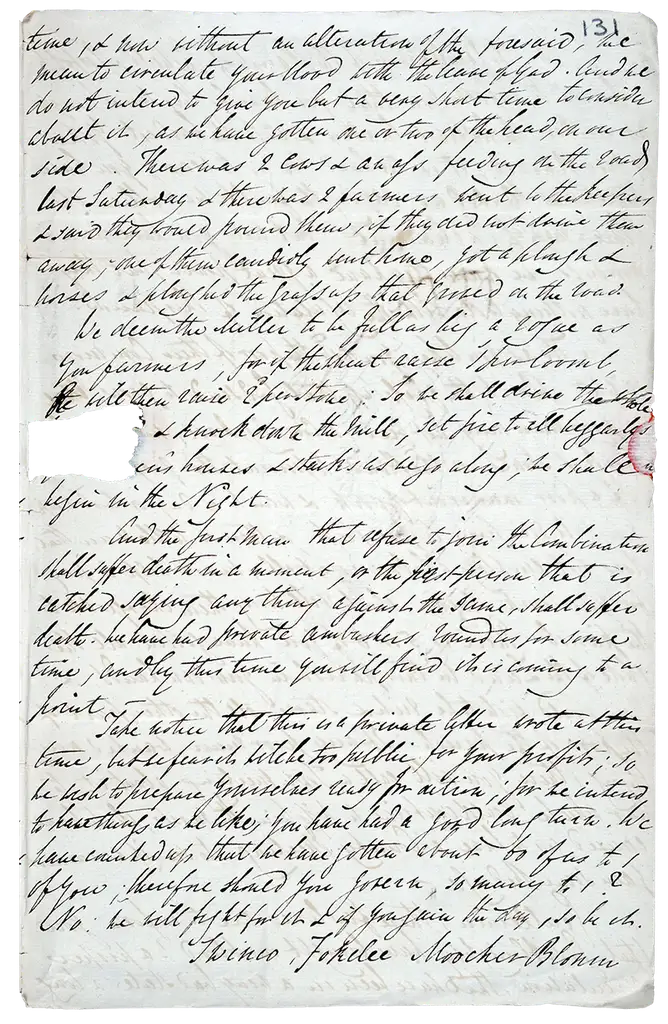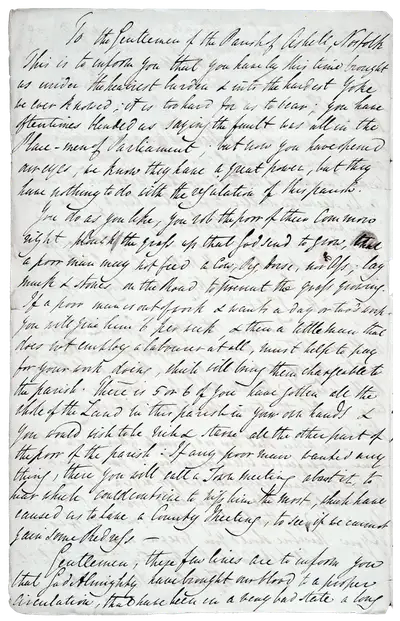Record revealed
Angry letter sent during the ‘Bread or blood’ riots
This letter gives a rare view of the words of ordinary people in 1816, here threatening violence in response to falling living standards in rural England.
Images
Image 1 of 2

Transcript
To the Gentlemen of the parish of Ashill, Norfolk. This is to inform you that you have by this time brought us under the heaviest burden & into the hardest yoke we ever knowed; it is too hard for us to bear; you have oftentimes blinded us saying the fault was all in the Place - men of Parliament; but now you have opened our eyes, we know they have a great power, but they have nothing to do with the regulation of this Parish.
You do as you like, you rob the poor of their Common right, plough the grass up that God send to grow, that a poor man may not feed a Cow, Pig, Horse, nor Ass; lay muck and stones on the Road to prevent the grass growing. If a poor man is out of work, & wants a day or two's work you will give him s6 per week, & then a little man that does not employ a labourer at all, must help to pay for your work doing, which will bring them chargeable to the Parish. There is 5 or 6 of you have gotten all the whole of the Land in this parish in your own hands & You would wish to be rich & starve all the other part of the poor of the parish: If any poor man wanted any thing, there you will call a Town meeting about it, to hear which could contrive to hiss him the most, which have caused us to have a County Meeting, to see if we cannot gain some Redress –
Gentlemen, these few lines are to inform you that God Almighty have brought our blood to a proper circulation, that have been in a very bad state a long
Image 2 of 2

Transcript
time, & now without an alteration of the foresaid, we mean to circulate your blood with the leave of God. And we do not intend to give you but a very short time to consider about it, as we have gotten one or two of the head, on our side. There was 2 cows & an ass feeding on the road last Saturday & there was 2 farmers went to the keepers & said they would pound them, if they did not drive them away; one of them candidly went home, got a plough & horses & ploughed the grass up that [growd] on the road.
We deem the Miller to be full as big a rogue as you farmers for if the wheat raise s1 per coomb, he will then raise 2d per Stone: So we shall drive the whole ------- & knock down the Mill, set fire to all beggarlys ------- houses & stacks as we go along; we shall begin in the Night.
And the first man that refuse to join the Combination shall suffer death in a moment, or the first person that is catched saying anything against the same, shall suffer death. We have had private ambushers round us for some time, and by this time you will find it is coming to a point –
Take notice that this is a private letter wrote at this time, but we fear it will be too public for your profits, so we wish to prepare yourselves ready for action; for we intend to have things as we like, you have had a good long turn. We have counted up that we have gotten about 60 of us to 1 of you. Therefore, should you govern so many to 1? No: We will fight for it, and if you gain the day, so be it.
Why this record matters
- Date
- 1816
- Catalogue reference
- HO 42/150
The period from 1815–1820 was a time of general political and social unrest. With Napoleon's defeat in 1815, around 400,000 men from the armed services were thrown onto a saturated labour market. This caused great economic and social stresses, evident in mass under- and unemployment and a continued rise in poor rate expenditure (welfare payments).
In grain-producing areas like East Anglia, farmers found that grain prices slumped while rents did not. They turned to cutting wages and laying workers off. In April and May 1816, rising unemployment and grain (thus bread) prices caused a series of disturbances often known as the ‘Bread or Blood’ riots. After earlier riots across East Anglia, disturbances broke out at Littleport and Ely in Cambridgeshire, with the poor demanding money and destroying property. Local magistrates responded by ordering further poor relief and promising to fix a minimum wage. At the same time, however, they called in nearby yeoman cavalry and troops.
This anonymous letter reveals the economic hardship faced by poorer parts of society. They show collective reasoning about why living standards were falling and what they themselves might do about it. A copy of the letter was sent to the Home Secretary by Bartholomew Edwards, Ashill near Watton, Norfolk, on 22 May 1816. In his covering letter, Edwards explained that the threatening letter had been found at the entrance gate to his house. He deemed it a ‘confirmation of the Spirit which prevails in this Neighbourhood’. The original was kept in hope that the author might be identified from their handwriting.
